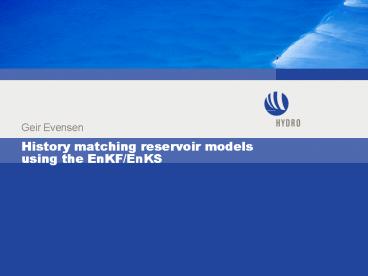History matching reservoir models using the EnKFEnKS - PowerPoint PPT Presentation
1 / 25
Title:
History matching reservoir models using the EnKFEnKS
Description:
36 000 employees in 40 countries. Leading offshore oil producer ... TOPAZ system: http://topaz.nersc.no. Meteorological Service of Canada ... – PowerPoint PPT presentation
Number of Views:408
Avg rating:3.0/5.0
Title: History matching reservoir models using the EnKFEnKS
1
History matching reservoir models using the
EnKF/EnKS
- Geir Evensen
2
Hydro Aluminium and energy supplier
- Founded 1905
- 36 000 employees in 40 countries
- Leading offshore oil producer
- Worlds third largest aluminium supplyer
- Pioneer in renewable energy and energy efficient
solutions
3
Hydro Research Centre, Bergen
Programs
60 Recovery
Small Fields
Polar Regions
Climate Renewable energy
Improved Exploration
4
Program 60 Recovery
Extend lifetime of mature fields
5
Introduction
- Simulation model must be consistent with the
reservoir production history to be used for
predicting future production. - History matching Tuning of model parameters or
parameter estimation. - For history mathcing we must
- Define the parameter space (porosity,
permeability, reservoir structure,
transmissibilities,.). - Define a cost fuction (prior statistical weights,
norm, etc.). - Chose a minimization method (gradient descent,
Monte Carlo, EnKF).
6
Minimization problem
- Highly nonlinear, multiple local minima.
- Hard to solve using traditional minimization
methods. - Data errors independent in time and model a
Markov sequence - Reformulation as a sequence of minimization
problems. - Each subproblem provides a prior for the next
problem. - Equivalent to solving the full problem in one go
for linear models. - Evensen 2005 (www.nersc.no/geir)
- Approach used by the EnKF/EnKS.
7
Update procedure in EnKS/EnKF
Time
d_1
d_2
d_3
Prediction EnKF update EnKS update
8
Nonlinear minimization problem
9
Ensemble Kalman Filter (EnKF)
- Statistical method which solves the combined
state and parameter estimation problem. - Monte Carlo version of the original Kalman
Filter. - EnKF home page http//www.nersc.no/geir/EnKF
- The EnKF is now used for ocean and weather
prediction - TOPAZ system http//topaz.nersc.no
- Meteorological Service of Canada
- Potential for history matching and reservoir
management?
10
Ensemble Kalman Filter (EnKF)
- Representation of uncertainty using an ensemble
of model solutions and randomized measurements - Describes error covariances for the model
estimate and measurements. - Uncertainty predictions by ensemble integration
- Each ensemble member is integrated using a
stochastic version of the dynamical model. - Includes the impact of model errors.
- Model ensemble is updated from measurements using
a variance minimizing analysis scheme - Assumption about Gaussian error statistics for
prediction.
11
True state
Initial state with errors
Time
12
Measurements with errors
True state
Model prediction with errors
Time
13
Measurements with errors
True state
Updated estimate with errors
Model prediction with errors
Time
14
Measurements with errors
True state
New model prediction with errors
Updated estimate with errors
Time
15
Measurements with errors
True state
Updated estimate with errors
Time
16
EnKF-Eclipse Implementation at Hydro
- Suite of F90 programs controlled by unix script
- Modular and model independent implementation.
- Based on generic EnKF distribution from
http//www.nersc.no/geir/EnKF/ - Simulation software for generation of the initial
ensemble. - Simulation of realizations based on statistical
geomodel. - Conditioning on log and AI data.
- Eclipse simulator is used as a black box
- Only used to integrate model states forward in
time. - interface between ECLIPSE and the EnKF
- Convert between ECLIPSE restart files and
ensemble files. - Differentiate between dynamic and static
variables. - EnKF analysis program.
17
EnKF-Eclipse ImplementationInitialization of
ensemble
Eclipse data file
Grid and restart info
eclipse
ens0F.uf ens0S.uf
Statistical geomodel
Poro/perm ensemble
iniens
ens0A.uf ens0S.uf
logobs.uf
EnKF
18
EnKF-Eclipse ImplementationEnsemble integration
and update
For j0, data_times
For i1,nrens
ensjA.uf ensjS.uf
Eclipse restart file
interface
eclipse
Eclipse restart file
ensj1F.uf ensj1S.uf
interface
done
ensj1F.uf
ensj1A.uf
EnKF
obsj1.uf
done
19
Estimation of permeability using EnKF
Reference
First guess
Estimate 25 months
Major structure of permeability field is
recovered!
20
Estimation of permeability using EnKF
Information from data accumulates in
time. Result is consistent with statistical
input model. Definition of initial statistical
model is crucial.
Results from idealized experiments are very
promising!
21
Some previous EnKF reservoir applications
- Nævdal, Mannseth and Vefring (2003), Near well
reservoir monitoring through EnKF, (SPE 75235). - Nævdal, Johnsen, Aanonsen and Vefring (2003),
Reservoir monitoring and continuous model
updating using EnKF, (SPE 84372). - Gu and Oliver (2004), History matching of the
PUNQ-S3 reservoir model using the EnKF, (SPE
89942). - Gao, Zafari and Reynolds (2003), Quantifying
uncertainty for the PUNQ-S3 problem in a Bayesian
setting with RML and EnKF, (SPE 93324). - Liu and Oliver (2005), Critical evaluation of the
EnKF on history matching of geological facies,
(SPE 92867). - Wen and Chen (2005), Real-time reservoir model
updating using EnKF, (SPE 92991).
All conclude positively regarding the use of EnKF
for history matching. All consider idealized
experiments.
22
EnKF-Eclipse for Oseberg Alpha North
- Complex reservoir.
- 5 producers.
- 3 injectors.
- Simulation model hard to match.
- Uncertainty about faults, barriers, channels, and
communication with other reservoirs.
23
(No Transcript)
24
Some preliminary remarks
- Good match for GOR at wells started early in
simulation. - Easy to fit unconstrained model to the first
production data. - Poor match for wells started late in simulation.
- Too large weight on early production data?
- Neglected model errors?
- Typical parameterization problem?
- Possible to include faults, structural errors,
transmissibilities? - Uncertainty in production data.
- 10-20 or more?
- QC of production data crucial.
25
Summary
- Ongoing field case with new Oseberg alpha north
model - Includes pluri-gaussian facies representation.
- Assimilates production and 4D seismic data.
- Ongoing field case for Rimfaks
- Collaboration with Statoil.































